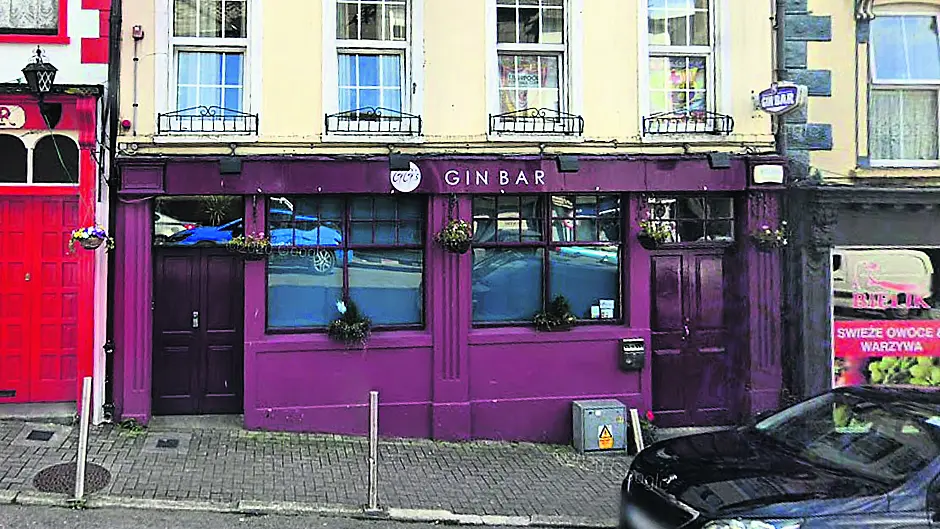A CIRCUIT court judge granted GG’s Gin Bar in Clonakilty a special exemption for the last Saturday night in July but advised the applicant, Gordon O’Sullivan that it is not, thereafter, a sustainable business model.
At a recent sitting of Skibbereen Circuit Court, Judge Helen Boyle said the objections from residents on McCurtain Hill were not as a result of public order or safety issues. She said it was more to do with nuisance.
‘They are prepared to tolerate 12.30am, but the 2am special exemption is a bridge too far for them,’ said the judge. ‘The noise is carrying up the hill.’
Judge Boyle was told at a previous court sitting in Bandon that gardaí were objecting to the granting of the late licence due to complaints from residents in the vicinity.
Tanya Lee, who lives on McCurtain Hill, said that on May 27th last she was returning from a barbeque at around 2.45am and said there were a lot of people on the street.
‘Everyone was aggressive, there was lots of shouting, fighting and yelling and I was afraid to go outside my door. The following day all my neighbours were talking about it and two had even rung the gardaí about it,’ she said.
‘It was exactly the same on the Sunday night of the June bank holiday weekend and it goes on for about an hour.
‘While the bar closes at 2am, people are still outside the bar after 3am and it’s all very aggressive with shouting and roaring.’
‘We’re afraid to go out of our front doors and those who can’t get into the bar, which is the town’s only late bar, make a nuisance outside.’
BL Patrick O’Riordan, instructed by solicitor Jack Purcell, said that gardaí maintain it is a well-run bar and that there are no active public order investigations taking place. He also said his client stops serving at 1.45am and makes sure all patrons have left the premises by 2am. Mr O’Riordan handed into court pictures from the night of June 25th last, which were taken at 1.44am.
‘These show people leaving the bar and there is little activity outside and no sign of rowdy behaviour,’ said Mr O’Riordan. Ms Lee said one can’t hear noise from a picture and said she had no issue with the bar, but had issue with the late licence and that it isn’t nice to be woken up at 3am.
Gordon O’Sullivan told Judge Boyle that he has worked in the bar trade for the past 27 years and has been running GG Gin’s Bar for the past five years. He said that Clonakilty is a vibrant town, but has no nightclubs since before Covid and the town needed a place for socialising after regular closing hours. He said his business had struggled as a result of Covid.
He said he employs four bouncers at his premises, which is for over 20s and has never had any trouble there.
He said that staff are instructed to stop serving at 1.45am and the bar is usually cleared by 2am.
‘We ask patrons to move down the street and we are out with the brushes cleaning up any litter. We control everyone who comes into our bar,’ said Mr O’Sullivan.
‘I do the front door and make sure no glasses or bottles are taken outside. Saturday nights carry my business and my staff too and it’s 90% of my turnover.’
Acting State solicitor Jerry Healy asked him if he had consent of the owner of the premises for the late licence. Mr O’Sullivan said he had and that it was the owner’s suggestion to apply for a late licence.
Mr Healy also asked if he has a dance licence, but Mr O’Sullivan said he does not have one as it’s not a nightclub.
Mr Healy produced a post from a social media page from the bar which indicated that it is a ‘party bar’.
However, Mr O’Sullivan said people may dance around their tables but it certainly is not a nightclub.
BL Patrick O’Riordan said his client did attempt to reach out to residents in the area, and that he has put a lot of work into it. However, Mr Healy said that Mr O’Sullivan must deal with where he is and that is a residential area, though he accepted he may run a good pub.
‘The nuisance and distress caused to residents is real. This is reality for them,’ said Mr Healy.
At Skibbereen Circuit Court, Judge Boyle said she had heard how Covid had been devastating for the applicant’s livelihood and how he needed to generate revenue at the height of the season.
‘I don’t think this is a sustainable business model for the applicant, given the level of unhappiness and perception of nuisance,’ she stated.
‘I think the best compromise is to grant the special exemptions for the two Saturdays in July on the basis that it is of some benefit to the economy, but thereafter it is not a sustainable model.’








